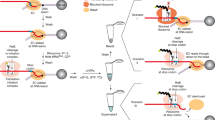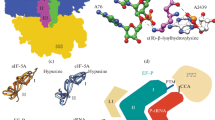Abstract
The elongation factor complex, EF-1H, serves an essential function in protein biosynthesis in eukaryotic cells, although the role of EF-1H in other physiological processes is unknown. In this report, we demonstrate that three components of EF-1H (EF-1β, EF-1δ, and EF-1γ) bind to DNA modified with chromium (Cr), a potent DNA-damaging agent and an established human carcinogen. The EF-1H complex also binds to transplatin modified DNA but not to cisplatin-modified DNA. These results demonstrate that the EF-1H complex has functional DNA binding activity and is capable of recognizing the distortions in DNA structure resulting from the covalent binding of Cr and transplatin to DNA.
Similar content being viewed by others
Author information
Authors and Affiliations
Additional information
Received: 15 October 1996 / Accepted: 11 February 1997
Rights and permissions
About this article
Cite this article
Wang, J., Engelsberg, B., Johnson, S. et al. DNA binding activity of the mammalian translation elongation complex: recognition of chromium- and transplatin-damaged DNA. Arch Toxicol 71, 450–454 (1997). https://doi.org/10.1007/s002040050410
Issue Date:
DOI: https://doi.org/10.1007/s002040050410




